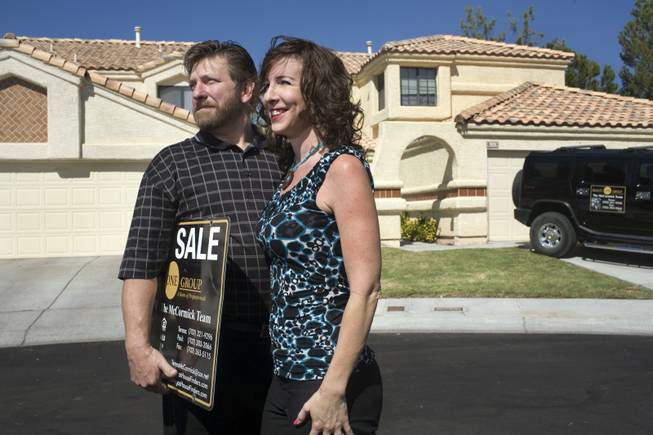
Real estate agents Paul and Teresa McCormick say the Nehemiah program has kept them afloat during the past year and a half, accounting for 22 of the 24 homes they sold.
Wednesday, Sept. 3, 2008 | 2 a.m.
Sun Topics
Sun Archives
- At ground zero of a national housing crisis (8-13-2008)
- Home sales up for 7th month; prices fall (8-6-2008)
Beyond the Sun
A Green Valley home with a front courtyard and a bubbling fountain is advertised in the newspaper with 100 percent financing.
It sounds suspicious, given how lenders are supposed to be demanding bigger down payments from buyers, but it’s a legitimate offer.
For years, the federal government has backed a specific type of fixed-rate loan to low-income buyers with steady jobs. The loan requires a down payment, though under government rules none of the money has to come from the prospective homeowner. Some of the down payment comes from the seller to help close the deal, and some can come from a nonprofit agency.
The “Nehemiah” program is popular because “there’s little to no money out of pocket and it’s easier to qualify (than under other programs) in terms of credit,” said local loan processor Shani Fazzi of First United Mortgage. Anyone approved for a Federal Housing Administration loan is eligible.
Under Nehemiah, sellers contribute from 3 percent to 6 percent of the price as a down payment, Fazzi says. Nonprofit organizations that are trying to help people buy homes typically kick in another 3 percent.
Despite its attraction to buyers, this seller-funded down payment assistance program will expire Oct. 1. But another loan program continues to help one segment of the market. A local nonprofit, HUGS (Help Us Give to Our Schools), has helped Clark County teachers buy homes, donating from $2,000 to $12,000 for each purchase, said Pamela Thilavanh, its president and founder. HUGS requires the buyer to pay 1 percent of the home’s price upfront as part of the down payment.
Sellers who participate in Nehemiah are likely to boost the price of their homes above market value to compensate for their contribution to the down payment, officials with the Housing and Urban Development Department say. Higher home costs increase the odds of foreclosure, HUD spokesman Brian Sullivan said.
“We noticed as time went on that these loans were failing at two or three times the (overall) frequency,” he said. “It’s not enough to put people into homes. You’ve got to keep them there.”
The number of Americans using Nehemiah spiked this decade. In 2006, about a third of loans approved by HUD were under Nehemiah, up from 1.7 percent in 2000.
Local real estate agents say the program has enabled families to buy homes they may not have been able to afford otherwise.
“When we get rid of this program, a lot of people will have to rent,” said agent Teresa McCormick, 34, who with husband Paul posted the advertisement for that home in Green Valley.
Over the past year and a half, most of their business — 22 of 24 homes sold — has been tied to that program. It’s kept them afloat in the depressed housing market.
HUD officials cite two reasons for the elimination of Nehemiah, including the one suggested by Sullivan: that above-market home prices increase the chance homeowners will end up owing more on the house than its value. The other reason: Banks are loath to lend to homeowners who avoid their own equity investment.
In Nehemiah’s absence, two home loan programs are being unveiled to help struggling homeowners.
Starting Sept. 22, any first-time homebuyer — not just teachers — can apply for a HUGS grant of $2,000 to $12,000 toward a down payment, Thilavanh says. Again, the homebuyers must chip in 1 percent of the price upfront.
And on Oct. 1 HUD will pivot its focus to aiding struggling homeowners.
Homeowners who have loan balances greater than the value of the property can apply for 30-year, fixed-rate loans through the Federal Housing Administration — if the lender agrees to accept some loss.
Under the $300 billion Hope for Homeowners, lenders must reduce loan balances to about 90 percent of the property’s value. In the Las Vegas Valley, homeowners are eligible for a maximum mortgage of $400,000.
For lenders, the advantage is that their loss likely would be much smaller than if the property were to lapse into foreclosure without the approval of a Hope for Homeowners loan, Sullivan says.
Under the Hope program, he added, “The lender has some guarantee that in the event of a subsequent foreclosure, FHA will pay the rest.”

Join the Discussion:
Check this out for a full explanation of our conversion to the LiveFyre commenting system and instructions on how to sign up for an account.
Full comments policy